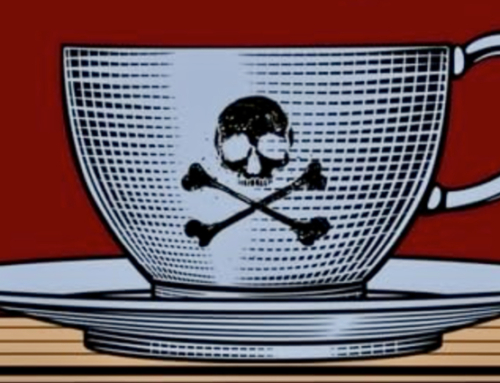
As I was preparing this afternoon for classes tomorrow (Monday), I came across a photocopy of a 1991 article by our very own Gleaves Whitney entitled “Decadence and Its Critics.” A wave of nostalgia overcame me. I first read the article (and have since re-read it many times) on a trans-Atlantic flight to Frankfort, en route to southern Jutland in Denmark. I had only graduated from college a year earlier, was about to begin writing my M.A. thesis, and was making a three-week trip over Christmas break to visit a close friend and her lovely family.
Before the advent of the post 9/11 security state and its particular evils, I loved to fly, especially trans-Atlantic. This time away from time always served as sacred reading space, and I had brought much to read on that flight that would be over only too quickly. One thing I threw into my backpack at the last minute–a hideously covered (as a man, I shouldn’t know the exact color, but I think it’s some form of pinkish periwinkle; see ugly thing at the top of this post) issue of the Intercollegiate Review.
Never trust an ISI journal by its cover. What was inside truly transformed my life. Articles by Gleaves, Mark Henrie, and Ralph Ancil opened (yes, I know this sounds cliche, but I suppose cliches develop because the human mind and soul have limitations in expression) my being to whole new realms of thought.
I was, not surprisingly to those of you who know me personally, a complete nerd in 1991–a lover and voracious reader of everything newsy, political, and economic; a wanna-be science fiction writer; a feverish Canasta player; a die-hard hiker and backpacker; and a complete snob regarding jazz, art, and progressive rock. Despite (or inspite) of these interests, I had never considered the “culture” as a serious avenue of and for study. I had taken several courses on myth and folklore (two subjects I love to this very day), but I considered the only interesting culture what could be found in the past or, at best, on my Sony Walkman. While I had slowly returned to the Catholic Church of my youth, I had found only an intellectual refuge there, not a beautiful one. I was far more interested in the rigorously logical arguments of Hayek, Friedman, and Mises than I was in the fancies of T.S. Eliot or Flannery O’Connor.
But, that flight and that grotesquely decorated Intercollegiate Review captured my imagination, and I dizzily marked my copy, argued with it, and wrote as many ideas as I could in the empty spaces before and after the articles and in the preciously small margins.
I had been a strong anti-communist from my first political awakenings (my GI Joes used to hunt–victoriously, I might add–the V.C. in my Kansas childhood playtime), and I have never once been attracted to any element of the Left. But my stances on the Right were informed only by the political and the economic. I had kept my imagination to myself in my teens and early 20s–a private matter, between me and whatever fiction author I was reading at the moment, whatever musician I was listening to, and whatever poor piece of paper found my attempts at poetry and fiction scribbled upon it.
Gleaves’s words in 1991 shattered whatever semi-coherent vision I had of the world. “And now the ineluctable question: whither Western civilization? . . . Might it become silent, desiccated, and shrouded in creeping vines, its ruins peering out at future generations like the faces of Angkor Wat?”
These were not the words I had read in Friedman’s weekly Newsweek column or in Mises’s Human Action. These were words–not diffidently–written by a man who loved. . . the words themselves. And, the ideas and intent of the words, ordered in a way to capture the rigors of the intellect as well as of the soul.
While I didn’t have the blessing of meeting Gleaves until the end of that decade (thank you, Winston, for the introduction), Gleaves became somewhat of a intellectual model for me, and I couldn’t get the questions that he or Mark Henrie (in the same issue, a wonderful piece entitled, “The Road to the Future”) had posed out of my mind.
We had “won” the Cold War, but we now seemed to have lost purpose.
“The very notion of norms, of first principles, of objective truths,” Gleaves fumed in that article, “is anethema to a generation that believes the Ten Commandments are Ten Suggestions.” Now, he was starting to sound much like my six-grade teacher, Sister Patricia Martinez, a fiercely intelligent Dominican Nun whom I had greatly respected. Was it ok, I wondered to leave the realm of logic and reason (Chicago and Austrian economics are nothing if not rational) and enter the suspect world of my childhood, a world in which ethics and morals were taken as simple “musts” for my fellow Kansans?

Gleaves referenced men whose names I’d heard at Notre Dame, but only in passing: Romano Guardini, Christopher Dawson, and Martin D’Arcy.
In every way, the four men mentioned in the last sentence/paragraph have shaped my own thoughts and writings on the world. As noted above, I finally had the chance to meet the first author named, Gleaves, in the late 1990s at Winston Elliott’s Free Enterprise Institute in Houston. I found in Gleaves the person even more than I had found in Gleaves the writer. Indeed, I found an intellectual inspiration, mentor, and brother. He has remained such for well over a decade now.
Ideas do, indeed, have consequences. So do friendships.
But, back on that Delta flight, screaming toward Frankfort at 650mph. The best part of Gleaves’s essay was still to come—in the penultimate paragraph. I won’t retype or paraphrase it here. But I will state this: when I read this paragraph for the first time, I knew what I wanted to do with my life.
That penultimate paragraph is still for you to discover. Enjoy.
Books on the topic of this essay may be found in The Imaginative Conservative Bookstore. The Imaginative Conservative applies the principle of appreciation to the discussion of culture and politics—we approach dialogue with magnanimity rather than with mere civility. Will you help us remain a refreshing oasis in the increasingly contentious arena of modern discourse? Please consider donating now.







Brad, you are always generous in your friendship. Let me assure you that the younger student (you) has eclipsed the older student (me) in the steady output of thoughtful essays, reviews, and books. You truly have become one of the finest essayists of our time. It has been a joy to see you grow in knowledge, understanding, and wisdom all these years. In the republic of letters, we all learn much from you, good friend, so don't hang up those spurs anytime soon.